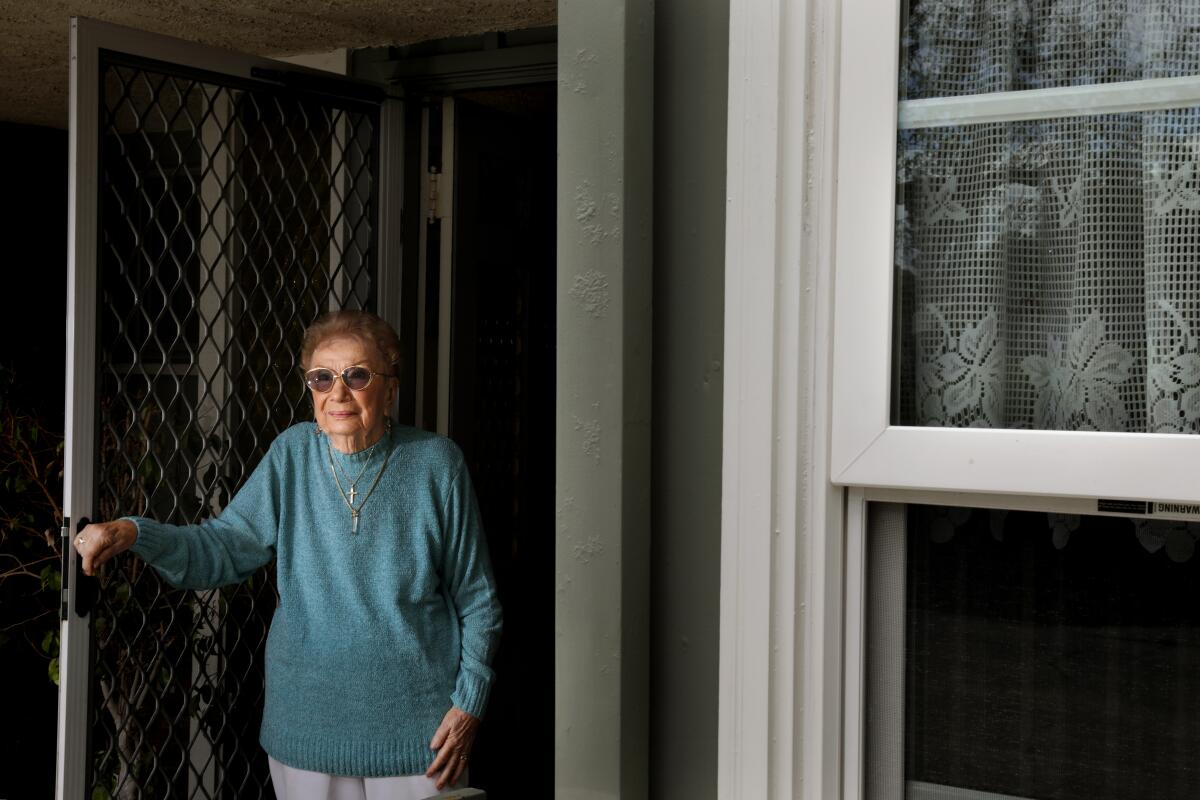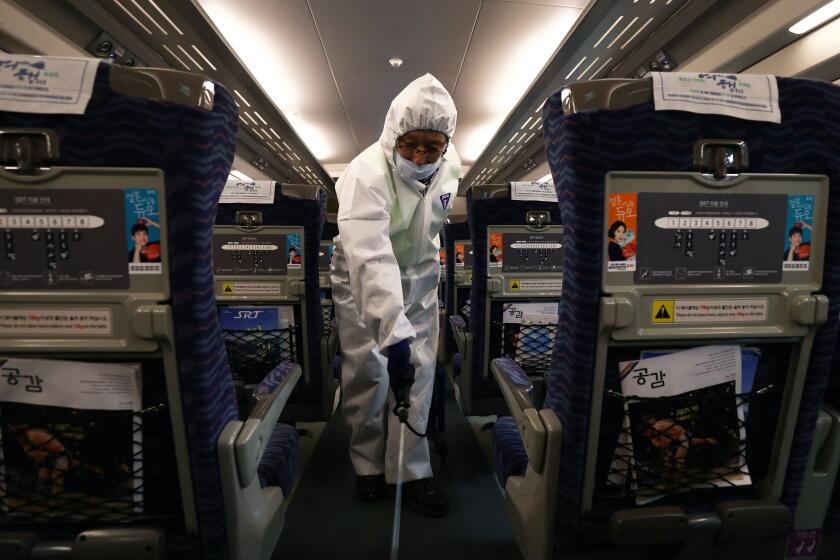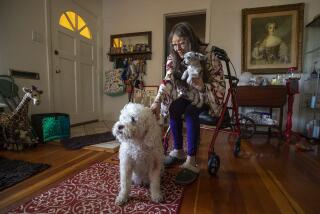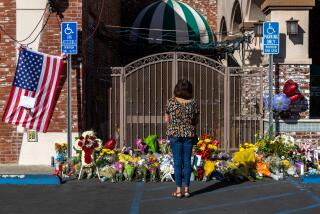Two sisters were inseparable for 9 decades. Now the coronavirus lockdown keeps them apart

- Share via
Since childhood, 91-year-old Corrine Casserly and her 95-year-old sister Ruth Sorney have been the closest of friends.
As young women coming into their own in Hollywood in the late 1940s, they’d put on their little black dresses most Saturday nights and pretend to be rich by treating themselves to chicken a la king at Tom Breneman’s restaurant by Sunset Boulevard and Vine Street.
They’d celebrate their Italian American heritage later in life at “Club Italiano” socials at St. John Eudes Catholic Church near their homes in the San Fernando Valley.
There were hair appointments every Friday at 10 a.m. at a salon in Woodland Hills, and twice a year the sisters would take the shuttle with their church’s senior club to a casino in San Bernardino, always splitting their winnings 50-50.
It seemed as if nothing could keep the sisters apart, not even the family’s decision to move Sorney into a long-term care home at the beginning of the year. Casserly, who lives only a few blocks away in Tarzana, visited every day.
Then the COVID-19 pandemic struck.
Governments and health officials around the world are trying to mitigate the spread of the coronavirus outbreak.
The residence where Sorney is being cared for has been placed on a precautionary lockdown. Visitors are no longer allowed, and Sorney, who has mild dementia and can’t walk on her own, is suddenly off limits.
“I need to be there for her,” Casserly said. To stay away even for a short time, she says, is “not my nature.”
The coronavirus has prompted the families and friends of the elderly to accept behaviors that would’ve seemed unthinkable just weeks ago.
To prevent the spread of the deadly respiratory disease among the sick and elderly, who are more susceptible to it, federal officials have ordered a nationwide temporary ban on visits by all but essential staff at senior-care homes and hospices.
Even in cases in which a resident is near death, special arrangements must be made to allow visitation by next-of-kin.
In this bizarre new age of social distancing, worried families have dreamed up novel ways to break down the walls that separate them from their relatives living inside these complexes. They wave at them from a distance, holding up handmade signs with loving greetings, and carry on conversations through closed windows.
Casserly says Sorney has called every day to let her know she’s all right and, like families around the country who have seniors living under outbreak-related lockdowns, the two have started using FaceTime to video chat.
21 photos look at what’s being called the new normal as people around the world deal with the coronavirus and the disease it causes, COVID-19.
“It’s very annoying,” Casserly said. “I can call her on the phone — that’s the best I can do. The fact that I can’t go there, see her and talk to her — or watch a couple of game shows with her from outside as we sometimes do — now that’s gone.”
Before the outbreak worsened in recent weeks, she was permitted to keep her sister company by sitting in the patio that leads into her room so the two could chat through the screen of a sliding door.
“I used to kiss her goodbye — now we blow kisses at each other,” Casserly said before she found out last week that she would no longer be allowed on the patio.
The new normal that she, the nation and the world have been thrust into comes as a blow to the bond that she and her sister have built up over nine decades.
“I always tell people we’re like twins — except we were born about five years apart,” Casserly says.
The sisters moved from Rochester, N.Y., to Los Angeles with their Italian immigrant parents in 1945. Their older brother Henry Sorney, who died in 2006, joined the family after serving in the Army Air Corps in World War II. Casserly, who goes by the nickname “Corky,” was 16. Sorney, who goes by “Ruthie,” was 20.
Not long after arriving in the city in their 1936 Ford “Woody” station wagon, the family bought a house in Hollywood.
And even though Sorney was older, Casserly enjoyed having her sister join sock hop house parties and horse-drawn hayrides with her and her friends from Hollywood High School.
Casserly got married and became a stay-at-home mom, raising five children in the house she bought in 1950 and still lives in as a widow twice over.
Sorney moved in with her parents as an adult and bought a house in Encino with them in 1964. She still owns that home. For much of her career, she worked as a telephone switchboard operator at a television station.
If you wanted to be friends with Casserly, you had to befriend Sorney too. Casserly says it was a package deal that even her second husband was warned about before they started dating in 1989.
“By golly it was true!” she says with a laugh. “We took her everywhere.”
A big Dodgers fan, Sorney would draw giggles from Casserly’s children during family gatherings as she yelled vulgarities at the players on the TV screen whenever they made an error.
“Oh, my God, she curses like a sailor!” Casserly recalls. “She knows every player and when they trade, she has a fit.”
Each week for nearly 70 years, Sorney joined for Sunday dinner at Casserly’s house in Tarzana.
The dinners were large affairs at first, with Sorney accompanying her parents. After they died, she came alone.
By last year, Sorney had become too physically weak to drive, so Casserly would simmer pasta sauce on Saturdays and drive dinner to her sister’s house to keep the Sunday ritual alive.
The family’s decision to take Sorney’s car keys away and move her into the senior care home wasn’t easy.
Many families already deal with feelings of guilt over having to place their loved ones in senior facilities. Not having access to them during the pandemic only adds to their grief and concern, says Barbara Wogh, a registered nurse in Woodland Hills who helps families access medical care for their aging relatives.
“They really feel bad that their relatives are in that situation — they picture them being lonely and sad,” Wogh said.
To make Sorney’s bedroom feel more like home, Casserly and her daughters brought in some of her furniture — a nightstand, a lamp, a chair from her living room and a TV for her to watch game shows and her beloved Dodgers.
“I’d sit by the bed and watch TV while Sorney napped,” Casserly said of her daily visits before the outbreak. “I had dinner with her a few nights a week. Going to see her every day was a joy for me.”
But Casserly says that given the danger posed by “this damn virus,” as she puts it, maybe it’s wise to accept the idea that some things don’t need to be done in person right now.
“I feel disconnected to a degree,” she says, “but the underlying emotional and spiritual bonds, they don’t break.
“We’re still very much together.”
More to Read
Sign up for Essential California
The most important California stories and recommendations in your inbox every morning.
You may occasionally receive promotional content from the Los Angeles Times.












